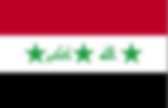

About Baghdad. Sunni identity and sectarian relations in post-civil war Iraq - 04 - 2012. Kuwait Programme on Development, Governance and Globalisation in the Gulf States public seminar Date: Wednesday 25 April 2012 Time: 4.30-6pm Venue: Graham Wallas Room, Old Building Speaker: Fanar Haddad Chair: Dr Kristian Ulrichsen Sectarian relations between Sunnis and Shi'as in Iraq have undergone profound change since 2003.
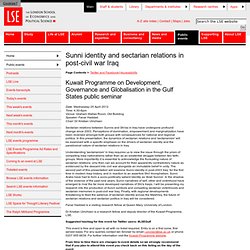
Perceptions of domination, empowerment and marginalization have been reversed amongst both groups with consequences for national and regional politics. In this presentation, the dynamics of sectarian relations and 'sectarianism' will be examined with a specific emphasis on the drivers of sectarian identity and the paradoxical nature of sectarian relations in Iraq. Understanding 'sectarianism' in Iraq requires us to view the issue through the prism of competing Iraqi nationalisms rather than as an existential struggle between two faith-groups.
Fanar Haddad is a visiting research fellow at Queen Mary, University of London. Twitter and Facebook Accessibility. Beating the Drums of Orientalism. The US occupation of Iraq, coupled with its attendant deployment of sectarianism as a political technology, has foreclosed the possibility of non-sectarian modes of seeing, or critiquing political life in Iraq.
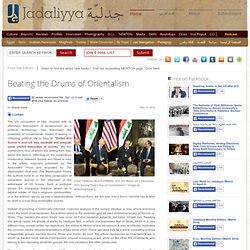
Review of Fanar Haddad, Sectarianism in Iraq: Antagonistic Visions of Unity « New Middle Eastern Studies. Adam Curtis Blog: BODYBUILDING AND NATION-BUILDING. The seductions of violence in Iraq. Some of the uprisings in the Arab world in 2011 demonstrated the appeal and the power of nonviolent protest.
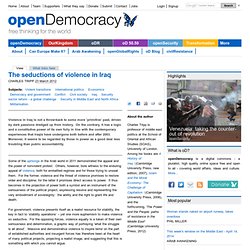
Others, however, bore witness to the enduring appeal of violence, both for embattled regimes and for those trying to unseat them. For the former, violence and the threat of violence promises to restore order and discipline; for the latter it promises direct access to power. It thus becomes in the projection of power both a symbol and an instrument of the seriousness of the political project, expressing resolve and representing the very embodiment of sovereignty: the ability and the right to grant life and death. For government, violence presents itself as a realist resource for stability, the key in fact to ‘stability operations’ – yet one more euphemism to make violence so seductive.
For the opposing forces, violence equally is a token of their own seriousness and determination, a graphic way of portraying ‘what the struggle is all about’. Iraqi Army Col. A violent central state. Charles Tripp · Militias, Vigilantes, Death Squads: Iraq’s Shadow State · LRB 25 January 2007. At a Downing Street meeting in November 2002 attended by Tony Blair, Jack Straw and six academics familiar with Iraq and the Middle East, two things became clear.
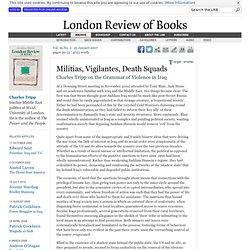
The first was that Straw thought post-Saddam Iraq would be much like post-Soviet Russia and could thus be easily pigeonholed as that strange creature, a ‘transitional society’. Either he had been persuaded of this by the recycled Cold Warriors clustering round the Bush administration, or they had failed to inform their ‘key ally’ of their determination to dismantle Iraq’s state and security structures. More ominously, Blair seemed wholly uninterested in Iraq as a complex and puzzling political society, wanting confirmation merely that deposing Saddam Hussein would remove ‘evil’ from the country. ‘Security’, defined in military terms and suggesting a military solution, was used to justify the invasion and subsequent occupation, as it had been used to justify the UN sanctions. You are not logged in. Corruption in Iraq: 'Your son is being tortured. He will die if you don't pay' The walls of Um Hussein's living room in Baghdad are hung with the portraits of her missing sons.
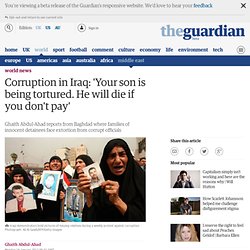
There are four of them, and each picture frame is decorated with plastic roses and green ribbons as an improvised wreath for the dead. Um Hussein had six children. Her eldest son was killed by Sunni insurgents in 2005, when they took control of the neighbourhood. Three of her remaining sons were kidnapped by a Shia militia group when they left the neighbourhood to find work. They were never seen again. She now lives with the rest of her family – a daughter, her last son, Yassir, and half a dozen orphaned grandchildren – in a tiny two-room apartment where the stink of sewage and cooking oil seeps through a thin curtain that separates the kitchen from the living room. Um Hussein looks to be in her 60s and has one milky white eye. Yassir was detained in 2007. "We waited until they brought him," she said. "I have lost four. "We had to send [the security men] phone cards so they could call us.
Plundering the Past: Scholarly Treasures.